De Afrocaraïbische schrijver en politicus Aimé Césaire werd geboren op 26 juni 1913 in Basse-Pointe, Martinique. Zie ook alle tags voor Aimé Césaire op dit blog.
Notebook of a Return to the Native Land (Fragment)
At the end of daybreak. . .
Beat it, I said to him, you cop, you lousy pig, beat it,
I detest the flunkies of order and the cockchafers of hope.
Beat it, evil grigri, you bedbug of a petty monk. Then I turned
toward paradises lost for him and his kin, calmer than the face
of a woman telling lies, and there, rocked by the flux of a
never exhausted thought I nourished the wind, I unlaced the
monsters and heard rise, from the other side of disaster, a
river of turtledoves and savanna clover which I carry forever
in my depths height-deep as the twentieth floor of the most
arrogant houses and as a guard against the putrefying force
of crepuscular surroundings, surveyed night and day by a cursed
venereal sun.
At the end of daybreak burgeoning with frail coves, the hungry
Antilles, the Antilles pitted with smallpox, the Antilles dyn-
amited by alcohol, stranded in the mud of this bay, in the dust
of this town sinisterly stranded.
At the end of daybreak, the extreme, deceptive desolate eschar
on the wound of the waters; the martyrs who do not bear witness;
the flowers of blood that fade and scatter in the empty wind
like the screeches of babbling parrots; an aged life mendacious-
ly smiling, its lips opened by vacated agonies; an aged poverty
rotting under the sun, silently; an aged silence bursting with
tepid pustules,
the awful futility of our raison d’être.
At the end of daybreak, on this very fragile earth thickness
exceeded in a humiliating way by its grandiose future—the vol-
canoes will explode, the naked water will bear away the ripe
sun stains and nothing will be left but a tepid bubbling pecked
at by sea birds—the beach of dreams and the insane awakening.
At the end of daybreak, this town sprawled-flat, toppled from
its common sense, inert, winded under its geometric weight of
an eternally renewed cross, indocile to its fate, mute, vexed
no matter what, incapable of growing with the juice of this
earth, self-conscious, clipped, reduced, in breach of fauna
and flora.
Vertaald door Clayton Eshleman
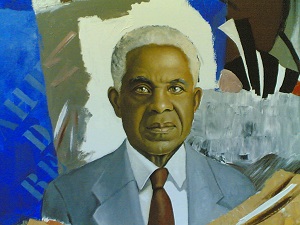
Aimé Césaire (26 juni 1913 – 17 april 2008)
De Nederlandse dichteres Jacqueline Elisabeth van der Waals werd geboren op 26 juni 1868 in Den Haag. Zie ook alle tags voor Jacqueline van der Waals op dit blog.
Oktober
De blaadjes waaiden
Langs alle wegen,
De blaadjes draaiden
In kringen rond –
Ik liep te drentelen
En kwam ze tegen,
Ik zag ze wentelen
Over de grond.
Het was oktober,
Wanneer de blaren,
Rood als rood koper,
Of geel van kleur,
In dichte scharen
Neer komen strijken –
Ik liep te kijken
En snoof de geur.
Wintermorgen
Week op het wit van het wazige land,
Week door het grijs van de wolken daarachter,
schemert de schijn van de zon, die met zachte
goudglans de zomen omrandt.
Blank als de glans op het wazig verschiet,
week als de schemer van de zon door het grijze,
weifelt het licht door mijn stille gepeinzen,
schemert de vreugde door mijn lied.
Kinderogen
Steeds zien uit een kindergezichtje
Twee droevige ogen mij aan,
Heel stil en geduldig. Ze vragen,
Een vraag, die ik niet kan verstaan.
Waarom, o kinderogen!
Waarom uit dat bleke gezicht,
Dat bleek en onschuldig gezichtje,
Die blik op mij gericht?
Ik kan u geen antwoord geven.
Ach zie mij zo vragend niet aan!
Gij wekt in mijn harte een onrust,
Een smart, die ik niet kan verstaan.
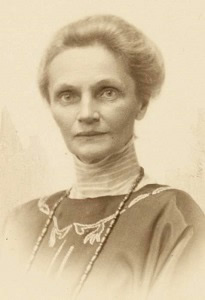
Jacqueline van der Waals (26 juni 1868 – 29 april 1922)
De Canadese schrijver Yves Beauchemin werd geboren op 26 juni 1941 in Rouyn-Noranda, Quebec. Zie ook alle tags voor Yves Beauchemin op dit blog.
Uit : Juliette Pomerleau
« Ma tante,
Je sais que vous aller me juger très sévèrement. Je sais que j’agis très mal et que je mérite les plus grand blâmes. Vous êtes la seule personne qui pouvez m aidez, voilà pourquoi je me suis adressé à vous. L’enfant que vous avez devant vous, c’est le mien. Il est né à Chicoutimi le 8 mai de l’an passé; c’est un garçon, il s’appelle Denis et je l’ai fait baptisé dans la paroisse de la Cathédrale. je ne suis pas sûre qui est son père (oui, je sais bien ce que vous êtes en train de penser de moi, mais je n’y peux rien). De toutes façons, avec les hommes que j’ai connu, il est mieux sans père.
J’ai essayée jusqu’ici de m’en occuper de mon mieux, mais là, je n’en ai plus la force. Avant de devenir une mauvaise mère, je préfère le confier à quelqu’un d’autre. J’espère que se sera vous qui en prendrez soin (car je connais votre bon cœur depuis longtemps), sinon, je vous demanderais de surveiller la personne qui en aura soin.
Je vous laisse deux boites qui contiennent tout son linge. Dans la boite la plus grosse (dans un petit gilet de laine bleu), vous trouverez 205 $ c’est tout l’argent que je possède actuellement. je vous en enverrai d’autre aussitôt que possible. N’essayez pas de me rejoindre, vous ne pourrez pas. De toute façon, ma décision est prise, je ne reviendrai pas là-dessus, on ne peut pas refaire sa vie, pas moi, en tout cas.
Je sais, vous devez vous dire, elle aurait pu venir me le remettre elle-même dans mes bras, la sans cœur. Mais justement, je sais que vous ne me croirez pas, mais j’ai du cœur, trop de cœur. J’avais trop honte de vous voir, ce qui fait que j’ai mieux aimé vous parlé par lettre. Et je me suis dit que c’était mieux aussi que de laisser mon enfant à la police. Pardonnez-moi. Faite que mon enfant soit heureux, moi, je n’y arrivais pas.
Pardonnez moi encore une fois.
Adèle”
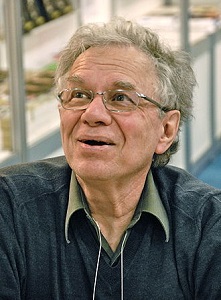
Yves Beauchemin (Rouyn-Noranda, 26 juni 1941)
De Duitse schrijfster Elisabeth Büchle werd geboren op 26 juni 1969 in Trossingen, Baden-Württemberg. Zie ook alle tags voor Elisabeth Büchle op dit blog.
Uit: Wohin der Wind uns trägt
“Aber er könnte annehmen, ich hätte es dir gleichgetan.“
„Das ist unmöglich. Simon weiß sehr wohl, was für eine gesittete und wohlerzogene Dame du im Gegensatz zu mir bist“, spottete Joanna und verschnürte den zweiten Schuh. Eilig zupfte sie die verschiedenen Schichten weißer Unterröcke und schließlich das blaue Organdykleid zurecht.
„Er ist da!“, zischte die aufgeregte Linda und Joanna wandte sich mit einem fröhlichen Lächeln nach ihrem Nachbarn um.
„Guten Abend, Simon Bryant. Haben sie dich aus den ehrwürdigen Mauern von
West Point hinausgeworfen?“
„Jo, du weißt sehr genau, dass Mr Bryant einen hervorragenden Abschluss errungen hat!“, begehrte Linda auf. Sie warf der Freundin einen vorwurfsvollen Blick zu, ehe sie ebenfalls,
mit tiefrotem Gesicht, zu dem schlanken, uniformierten jungen Mann aufsah.
„Danke für die Ehrenrettung, Miss Fowler. Aber Olivers Schwester hat selten einmal ein freundliches Wort für mich übrig.
Seit sie und ihre große Familie auf der Green-Crystal-Plantage leben, hatte ich Zeit, mich an ihre spitze Zunge zu gewöhnen.“
Joanna lächelte dem Freund ihres ältesten Bruders Oliver zu und wandte sich dann wieder in Richtung des Bachbettes um. Sie beobachtete scheinbar interessiert ein Libellenpärchen, das sich in wilden Schleifen über das von der Sonne silbern angestrahlte Wasser bewegte, während Simon Linda höflich begrüßte. „Darf ich den Damen ein Glas Bowle bringen?“, fragte er schließlich.”
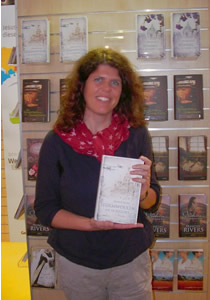
Elisabeth Büchle (Trossingen, 26 juni 1969)
De Engelse dichter en schrijver Laurence Edward Alan “Laurie” Lee werd geboren in Stroud, Gloucestershire op 26 juni 1914. Zie ook alle tags voor Laurie Lee op dit blog.
Uit: As I Walked Out One Midsummer Morning
“The violence of the heat seemed to bruise the whole earth and turn its crust into one huge scar. One’s blood dried up and all juices vanished; the sun struck upwards, sideways, and down, while the wheat went buckling across the fields like a solid sheet of copper. I kept on walking because there was no shade to hide in, and because it seemed the only way to agitate the air around me…I walked on as though keeping a vow, till I was conscious only of the hot red dust grinding like pepper between my toes.”
(…)
“I remember the beggars as something special to Valladolid, something it had nursed to a peak of malformation and horror. One saw them little by day; they seemed to be let out only at night, surreptitiously, like mad relations..Young and old were like emanations of the stifling medievalism of this pious and cloistered city; infected by its stones, like the pock-marked effigies of its churches, and part of one of the more general blasphemies of Spain.”
(…)
“But I think my most lasting impression was still the unhurried dignity and noblesse with which the Spaniard handled his drink. He never gulped, panicked, pleaded with the barman, or let himself be shouted into the street. Drink, for him, was one of the natural privileges of living, rather than the temporary suicide it so often is for others. But then it was lightly taxed here, and there were no licensing laws; and under such conditions one could take one’s time.”
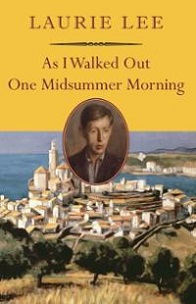
Laurie Lee (26 juni 1914 – 13 mei 1997)
De Amerikaanse schrijfster Pearl S. Buck werd geboren in Hillsboro West-Virginia, op 26 juni 1892. Zie ook alle tags voor Pearl S. Buck op dit blog.
Uit: Pavilion of Women
“Yet there were times when he did love her with all the kindness she demanded, and how was she to know what were those times? Alone she raged against his cheerfulness and put herself at the mercy of her own love and longed to be free of it because it made her less than he and dependent on him. But how could she be free of chains she had put upon herself? Her soul was all tempest. The dreams she had once had of her life were dead. She was in prison in the house. And yet who was her jailer except herself?”
(…)
“Had she not created even him? Perhaps for that he never forgave her, but hated her and fought her secretly, and dominated her and oppressed her and kept her locked in houses and her feet bound and her waist tied, and forbade her wages and skills and learning, and widowed her when she was dead, and burned her sometimes to ashes, pretending that it was her faithfulness that did it.”
(…)
“Know thy neighbor as thyself. That is, comprehend his hardships and understand his position, deal with his faults as gently as with your own. Do not judge him where you do not judge yourself…this is the meaning of the word LOVE.”
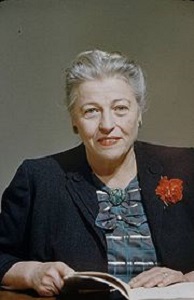
Pearl S. Buck (26 juni 1892 – 6 maart 1973)
De Engelse dichter en schilder Branwell Brontë werd op 26 juni 1817 geboren in Thornton, Yorkshire. Zie ook alle tags voor Branwell Brontë op dit blog.
Epistle To The Labouring Poor (Fragment)
All you who turn the sturdy soil,
Or ply the loom with daily toil,
And lowly on through life turmoil
For scanty fare,
Attend, and gather richest spoil
To soothe your care.
I write with tender, feeling heart,
Then kindly read what I impart;
‘Tis freely penned, devoid of art,
In homely style,
‘Tis meant to ward off Satan’s dart,
And show his guile.
I write to ope your sin-closed eyes,
And make you great, and rich, and wise,
And give you peace when trials rise,
And sorrows gloom;
I write to fit you for the skies
On Day of Doom.
What, though you dwell in lowly cot,
And share through life a humble lot?
Some thousands wealth and fame have got,
Yet know no rest:
They build, pull down, and scheme and plot,
And die unblest.
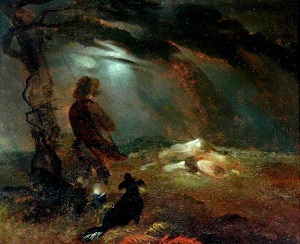
Branwell Brontë (26 juni 1817 – 24 september 1848)
The Lonely Shepherd door Branwell Brontë, 1838-1839
Zie voor nog meer schrijvers van de 26e juni ook mijn twee blogs van 26 juni 2011.
